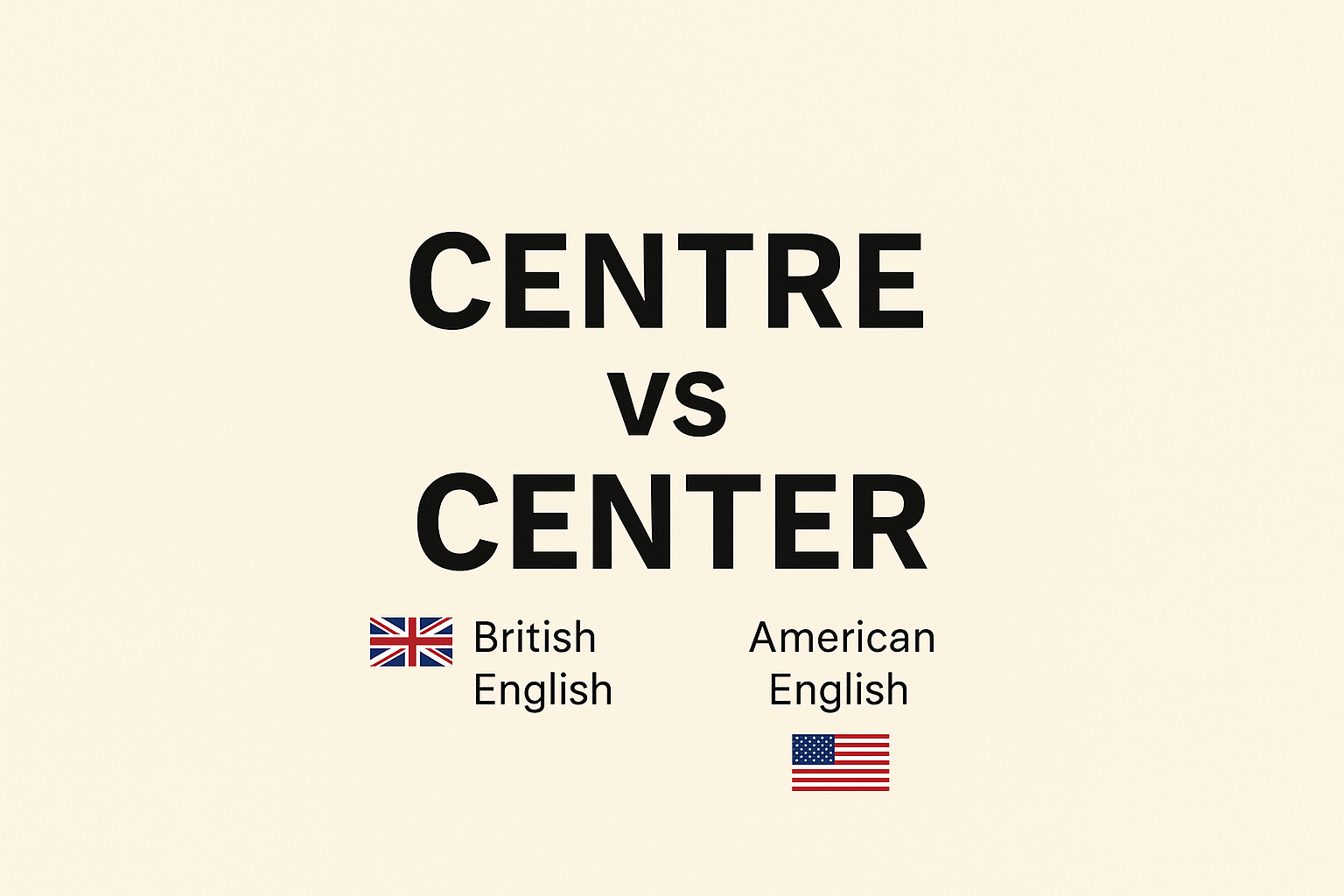Centre vs Center

The spelling choice between centre vs center may seem minor, but it speaks volumes about where you’re from and who you’re writing for. Both words refer to the middle point of something, whether it’s a physical location, a political hub, or even a concept like attention. The confusion typically stems from the difference between British and American English.
While “center” is the standard spelling in American English, “centre” is preferred in British English and in many countries that follow British spelling conventions, like Canada and Australia. But is one more correct than the other?
In this article, we’ll explore the spelling variations of centre vs center, offer examples of correct usage, highlight common mistakes, and give you tips to remember which spelling to use depending on your audience.
Grammatical Explanation of Centre vs. Center
Grammatically, centre vs center are the same word with two different spellings, depending entirely on the variant of English being used:
- “Center” is the preferred spelling in American English for both noun and verb forms.
- Example (noun): The conference will be held at the city center.
- Example (verb): Please center the text on the page.
- “Centre” is the standard spelling in British English for the same uses.
- Example (noun): The shopping centre is just around the corner.
- Example (verb): She centred the painting on the wall.
The plural forms also differ:
- American: centers
- British: centres
In essence, there is no difference in meaning between centre vs center—only in spelling preference. Choose the one that matches your intended audience or style guide.
Real-Life Examples of Centre vs Center
Correct Usage of “Center” (American English):
- The town center is full of restaurants and shops. ✅
- He centered the picture perfectly on the wall. ✅
- The sports center was recently renovated. ✅
Correct Usage of “Centre” (British English):
- The new leisure centre has a gym and swimming pool. ✅
- The painting was beautifully centred on the canvas. ✅
- She works at a medical centre in London. ✅
Incorrect Usage:
- We are meeting at the city centre. ❌ (Incorrect in American context)
- Please centered the text. ❌ (Wrong verb form)
- They rebuilt the center and added more shops. ❌ (Incorrect in UK formal writing)
Understanding centre vs center helps you maintain regional consistency and avoid jarring errors in tone and spelling.
Common Mistakes
The most common mistake in the centre vs center discussion is mixing British and American spellings in the same document. This inconsistency can be distracting, especially in professional or academic writing.
For instance:
- Incorrect: The shopping centre in New York has great stores. ❌ (Should be “center” in American English)
- Incorrect: They met at the town center in London. ❌ (Should be “centre” in British English)
Another error is misusing the verb form, especially in past tense:
- Incorrect: He center the image. ❌
- Correct (US): He centered the image. ✅
- Correct (UK): He centred the image. ✅
Choose a regional style and stick with it throughout your writing to avoid these common pitfalls.
For more grammatical tips in our blog Spelling Confusion Grammar/Usage Confusion
Memory Tips
Here’s how to remember the difference between centre vs center:
- Center = American English
Tip: “Center” has an “er” ending like other American spellings: color, meter, fiber. - Centre = British English
Tip: “Centre” follows the British tendency to flip “-er” endings to “-re”: theatre, litre.
Mnemonic:
- “ER” for USA “Centre” is not the centER of American spelling.
- “RE” is a Royal English ending like in theatRE and litRE.
Using this quick trick will help you choose the correct form every time you write centre vs center.
Conclusion
When choosing between centre vs center, it’s all about regional spelling. Use “center” for American English and “centre” for British English. While the meanings are identical, consistency in style is essential, especially in professional writing.
For more guidance on spelling variations, visit this Cambridge Dictionary resource on UK vs US English.